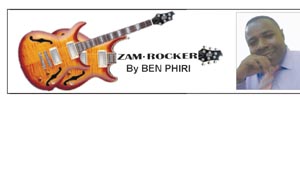 FEMALE music icon Dorothy Masuka is undoubtedly Africa’s most treasured legend that has printed an indelible mark on the continent’s entertainment circuit.
FEMALE music icon Dorothy Masuka is undoubtedly Africa’s most treasured legend that has printed an indelible mark on the continent’s entertainment circuit.
Untie Dotty as she is fondly referred to, was a household name in the Southern African region where she teamed up with late veteran musician Miriam Makeba and Hugh Masekela during her early days in South Africa.
Her songs really, were not only meant for the liberation of her country Southern Rhodesia(Zimbabwe) alone, but for the whole region which was then under the colonial yoke.
The Zimbabwean born musician holds Zambia as her real home having spent 16 years here, providing some backup through liberations songs while her country men and women fought for her country’s freedom.
“I have several grand children in Choma and Mongu. I have also bought a farm in Choma and so, Zambia is my home,” Masuka said in an interview from her base in South Africa.
Songs such as Tinogara Msango (Senerera), Kanyama (kang’ono, ng’ono), Pata Pata
(Also done by Makeba), Teya Teya and Mzilikazi, were among the best sellers in the region.
Masuka was probably Africa’s best selling recording artiste and her songs produced during the golden era of township jazz in the 1950s, are regarded as African classics.
For those who still remember her, the message is that, untie Dotty will be performing live at the Government Complex in Lusaka on July 5, with other shows slated for the Copperbelt.
Masuka is happy to be back in Zambia and fondly remembers some of the country’s legends such as Emmanuel Mulemena and Alick Nkhata both with whom she recorded music and also Zambia Music Parlour director Edward Khuzwayo.
“Hey, I remember Alick Nkhata we did together the song Ichi Bamu Chama Figa, and you know, he taught me Chibemba and Nyanja. I always asked him what certain words meant in Chibemba and he could tell me.” Masuka recalls.
Mulemena is also on her memories remembering recordings done together with him at Chingola’s Malachite Studio where he worked as producer then.
“I hear that there are some remnants of his called the Mulemena Boys? I want to meet them and listen to their songs when I come home,” Masuka said.
Born in 1935 as Dorothy Masuku, Masuka is actually a mis-spelling that originated from record labels during her early recordings in Bulawayo in the then Southern Rhodesia.
She went to South Africa at the age of 12 years and enrolled as a student at a Catholic boarding school and afterwards came of age during the early 1950s just as the first great flowering of the urban African culture in South Africa was getting underway.
Most popular then was music entertainment which became most prominent among the wage earning African migrants who provided a financial underpinning for a variety of cultural activities especially in Johannesburg townships such as Soweto for example.
By the age of 16, Masuka had already made her intentions known by releasing the first record and by 1953; she was a fully fledged musician stealing the limelight from migrant African gold miners who swayed to mostly African township Jazz which was the in thing then.
As she became more popular, Masuka became even more brave composing songs that were critical of the Apartheid governments of Rhodesia and South Africa and this did not go well with the Boer authorities.
Sensing danger, Masuka fled South Africa to go back to her native Southern Rhodesia just as the government was closing in on her.
Back in her native country, she continued with her controversial songs and later went to London and performed at Wembly Stadium during Harold Wilson’s election campaigns.
After coming back, Masuka performed with the famous Golden Rhythm Crooners, but that did not take her very far as the Ian Smith regime was on her shortly after it wrested control of the territory from the British government.
Described as subversive by the White minority government, Masuka fled into the newly independent Zambia in 1965 where she spent the following 16 years working, singing and recording music.
She made a good combination with the likes of Makeba and Yvonne Nobambo, another Zimbabwean singer then exiled in Zambia.
Masuka performed with many local bands like the Big Gold Six and Broadway Quintet who backed her on most of her popular local recordings.
“I have recorded many songs and I can’t remember the number, they are so many,” Masuka said.
Other songs she produced in her career include Nhingirikiri, Naledi, Manyere, Ngotsotsi, Lendaba, Impi, Khuteni Zulu, Ufikizolo and Hamba, a feat which veteran musician Cephas Maseko describes as fantastic.
“Masuka is a legend and a highly talented musician who has passed through difficulties to be where she is,” Maseko said.
Masuka also worked as an air hostess for the now defunct Zambia Airways during which time she survived two air crashes.
In 1981, when Zimbabwe gained independence, Masuka returned home to continue with her music career.
She was allowed to return to South Africa in 1992 following an imminent political change and a general easing of apartheid era policies.
Masuka is really a Zambian as her part of her roots is traced to this friendly country.
Comments: benjphiri990@gmail.com; 0971 933809, www.times.co.zm






